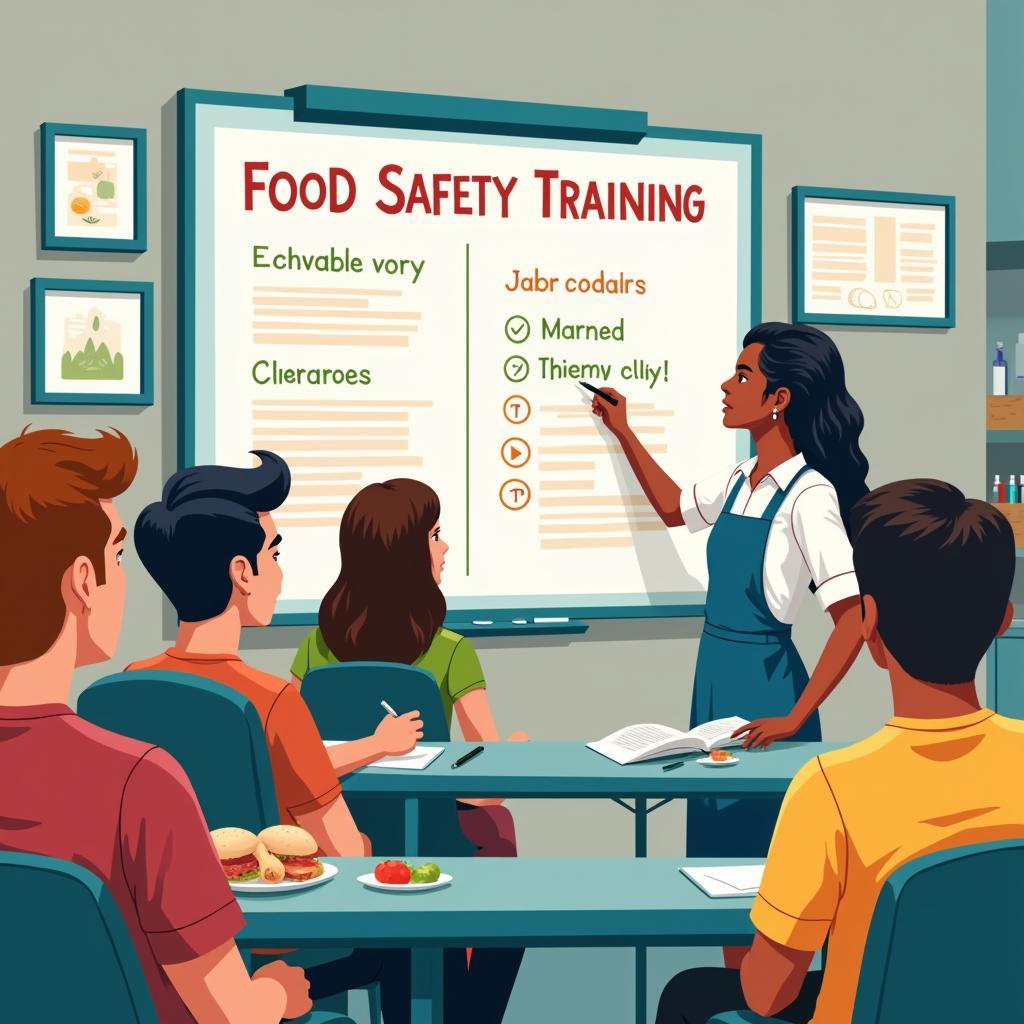Ensuring the safety and well-being of your customers is paramount in the food and beverage industry. An alcohol and food safety awareness certificate demonstrates your commitment to responsible alcohol service and safe food handling practices. But what exactly does this certificate entail, and why is it so crucial for your business?
Understanding the Importance of an Alcohol and Food Safety Awareness Certificate
This certificate signifies that an individual has received comprehensive training on the safe handling of food and responsible service of alcohol. This includes understanding legal requirements, recognizing signs of intoxication, preventing foodborne illnesses, and maintaining a safe environment for both staff and customers.
 Food Safety Training Session
Food Safety Training Session
Key Benefits of Obtaining the Certificate
For Individuals:
- Enhanced Job Prospects: This certification makes your resume stand out, demonstrating your commitment to safety and increasing your employability in the food and beverage sector.
- Increased Knowledge and Confidence: You’ll gain a thorough understanding of best practices, boosting your confidence in handling challenging situations.
- Reduced Risk: By learning how to identify and prevent potential hazards, you contribute to a safer environment for yourself and those around you.
For Businesses:
- Improved Customer Safety: Trained staff ensure responsible alcohol service, minimizing the risks associated with overconsumption.
- Enhanced Reputation: Certification demonstrates your commitment to safety and responsible business practices, building trust with customers and authorities.
- Potential Cost Savings: Proactive measures can help prevent costly fines, legal issues, and reputational damage associated with foodborne illnesses or alcohol-related incidents.
What Does the Training Cover?
While specific course content may vary, most alcohol and food safety awareness programs address the following key areas:
Food Safety Essentials:
- Basic Food Microbiology: Understanding common foodborne pathogens and how they spread.
- Safe Food Handling Practices: Proper storage, preparation, cooking, and serving techniques to prevent cross-contamination and bacterial growth.
- Temperature Control: Maintaining safe food temperatures to prevent the growth of harmful bacteria.
- Personal Hygiene: Importance of handwashing, glove use, and overall cleanliness in preventing food contamination.
- Allergen Awareness: Identifying and managing allergens to prevent allergic reactions in customers.
Responsible Alcohol Service:
- Legal Requirements: Understanding local laws regarding alcohol sales, consumption, and serving to minors.
- Recognizing Intoxication: Identifying signs of intoxication and strategies for refusing service responsibly.
- Preventing Overconsumption: Techniques for promoting responsible drinking habits among customers.
- Handling Difficult Situations: Managing conflicts, dealing with intoxicated individuals, and diffusing potentially volatile situations.
- First Aid and Emergency Procedures: Basic first aid knowledge and procedures for handling alcohol-related emergencies.
How to Get Certified
Numerous reputable organizations offer alcohol and food safety awareness training and certification programs. Look for courses accredited by recognized bodies in the food and beverage industry. These courses are typically offered online and in-person, providing flexibility to fit your schedule.
Frequently Asked Questions
How long does the certification last?
Certification validity varies depending on your location and the issuing organization. Generally, it’s recommended to renew your certificate every few years to stay updated on the latest regulations and best practices.
Is online training as effective as in-person training?
Both online and in-person training can be equally effective if the course is comprehensive and engaging. Online training offers flexibility, while in-person training allows for more direct interaction with instructors and fellow participants.
 Group Studying Food Safety Manual
Group Studying Food Safety Manual
What are the consequences of not having this certification?
The consequences of not having proper certification vary by region. Businesses may face fines, legal action, or even closure. Individuals may lose job opportunities or face disciplinary measures.
Conclusion
Obtaining an alcohol and food safety awareness certificate is not just a legal requirement in many places but a crucial step towards ensuring a safe and responsible environment for everyone. By investing in this training, you demonstrate your commitment to customer well-being, enhance your business’s reputation, and contribute to a safer food and beverage industry as a whole.
Need assistance? Contact us at Phone Number: 02437655121, Email: minacones@gmail.com, or visit us at 3PGH+8R9, ĐT70A, thôn Trung, Bắc Từ Liêm, Hà Nội, Việt Nam. Our dedicated customer support team is available 24/7 to assist you.